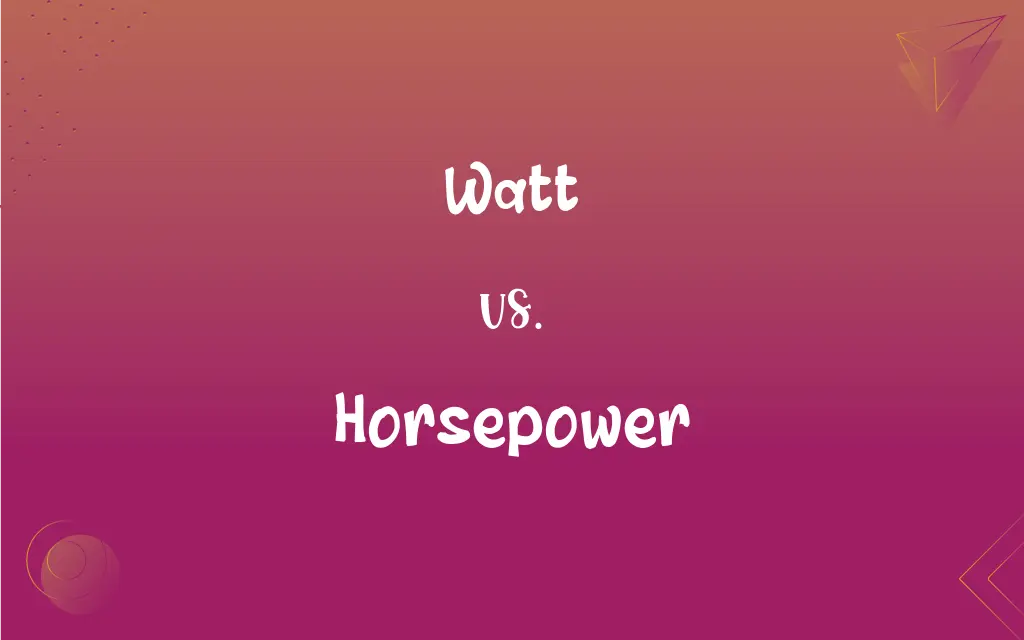Watt vs. Horsepower: What's the Difference?
Edited by Harlon Moss || By Janet White || Updated on October 2, 2023
A watt is a unit of power in the International System of Units (SI), and one horsepower is equivalent to 746 watts, measuring the rate at which work is done or energy is transferred.

Key Differences
A watt (W) is the basic unit of power in the SI system, derived from the meter-kilogram-second (MKS) system of units. It quantifies the rate of energy transfer or conversion, with one watt equivalent to one joule per second. On the other hand, horsepower (hp) is a unit of power that originated from comparing machine power to that of horses, commonly used to describe the power output of engines or motors.
Watts are used universally in the measurement of electrical power, among other applications. The watt's versatility allows for its use in describing power in many contexts, including electrical, mechanical, and thermal. In contrast, horsepower is traditionally used in the automotive and machinery industries to describe the power capabilities of engines and is still prevalent due to its early adoption in these sectors.
The watt can be used to express power in any form of energy per unit time, making it a versatile and widely accepted measure for power. In comparison, a horsepower specifically represents a rate of doing work equivalent to 550 foot-pounds per second or 745.7 watts, and it is not as versatile as the watt for different applications.
To give perspective, one watt is the power produced by a current of one ampere across the potential difference of one volt. Horsepower, however, with its specific conversion factor, serves as a high-magnitude unit suitable for expressing the high power levels involved in engine work and other similar contexts.
While the watt's acceptance and application are universal and wide-ranging across various science and engineering fields, the use of horsepower is more specialized and traditional, mainly reserved for vehicles, machinery, and some aspects of aerodynamics. Its continued use is largely attributed to convention and consumer familiarity, especially in the automotive industry.
ADVERTISEMENT
Comparison Chart
Unit System
SI unit
Imperial unit
Equivalent
1 joule/second
746 watts or 550 foot-pounds/second
Application
Universal, used in various fields
Primarily in automotive and machinery
Measurement
Measures power in any form of energy per unit time
Measures work done over time, specifically suited for engines
Versatility
Extremely versatile
More specialized
ADVERTISEMENT
Watt and Horsepower Definitions
Watt
Used to quantify power in electrical terms primarily.
The device requires a minimum of 100 watts to operate efficiently.
Horsepower
A unit of power equating to 745.7 watts.
This car engine has an output of 300 horsepower.
Watt
Measures the rate of energy conversion or transfer.
This appliance has a maximum output of 1500 watts.
Horsepower
Common in the automotive and machinery industries.
Consumers often consider horsepower when purchasing new vehicles.
Watt
Equivalent to one joule per second.
The gadget operates at a mere two watts.
Horsepower
Traditionally used to express the power output of engines.
The lawnmower operates at 5.5 horsepower.
Watt
A unit of power in the International System of Units (SI).
A 60-watt bulb consumes 60 joules of energy per second.
Horsepower
Developed to compare the power of machines to that of horses.
Early steam engines were often measured in horsepower to illustrate their capabilities.
Watt
Can represent power in terms of mechanical, thermal, or electrical energy.
The heater has a power rating of 2000 watts.
Horsepower
Represents the rate of doing work.
The motor's capacity is 150 horsepower, indicating its robust performance.
Watt
An SI-derived unit of power equal to one joule per second. See Table at measurement.
Horsepower
Abbr. hp A unit of power in the US Customary System, equal to 745.7 watts or 33,000 foot-pounds per minute.
Watt
In the International System of Units, the derived unit of power; the power of a system in which one joule of energy is transferred per second. Symbol: W
Horsepower
The power exerted by a horse in pulling.
Watt
A unit of power or activity equal to 107 C.G.S. units of power, or to work done at the rate of one joule a second. An English horse power is approximately equal to 746 watts.
Horsepower
(Informal) Effective strength
Political horsepower.
Computer horsepower.
Watt
A unit of power equal to 1 joule per second; the power dissipated by a current of 1 ampere flowing across a resistance of 1 ohm
Horsepower
(uncountable) Power derived from the motion of a horse.
Watt
Scottish engineer and inventor whose improvements in the steam engine led to its wide use in industry (1736-1819)
Horsepower
A nonmetric unit of power (symbol hp) with various definitions, for different applications. The most common of them is probably the mechanical horsepower, approximately equal to 745.7 watts.
Horsepower
A metric unit (symbol often PS from the German abbreviation), approximately equal to 735.5 watts.
Horsepower
(uncountable) Strength.
Political horsepower
Horsepower
A unit of power equal to 746 watts
FAQs
How does Watt relate to energy?
Watt measures the rate of energy conversion or transfer.
Can a watt measure mechanical power?
Yes, it can represent power in mechanical, electrical, or thermal terms.
What is a Watt?
It is the SI unit of power equivalent to one joule per second.
Is Horsepower an SI unit?
No, it is an Imperial unit of power.
What does Horsepower measure?
It measures the rate at which work is done, commonly used for engine power.
How many watts are in one Horsepower?
One horsepower is equivalent to 746 watts.
Is Horsepower only used for vehicles?
It’s primarily used for vehicles but also for other machinery.
Can Watt measure electrical power?
Yes, it is commonly used to measure electrical power.
How is Horsepower calculated?
It’s traditionally calculated as 550 foot-pounds of work per second.
Where is Horsepower most commonly used?
It’s most commonly used in the automotive and machinery industries.
Why is Horsepower still in use?
It remains in use due to tradition and consumer familiarity, especially in the automotive sector.
Why is Horsepower called so?
It was developed to compare the power of steam engines to horses.
Is Watt used universally?
Yes, it is a universal unit used across various fields for measuring power.
What is the origin of Horsepower?
It was coined by James Watt in the 18th century to compare steam engine power to horse power.
Can Horsepower be converted to other power units?
Yes, it can be converted to other units like watts or BTUs, using specific conversion factors.
Is one unit superior to the other?
No, they are used in different contexts; watt is more versatile, horsepower is more specific.
Is Watt a base SI unit?
Yes, it is a derived base unit in the SI system.
Is the wattage of an appliance the energy it uses?
It represents the rate of energy use, not the total energy consumed.
How is Watt represented symbolically?
It is represented by the symbol 'W'.
Can Watt measure power of any form of energy?
Yes, it can measure the power of any form of energy conversion or transfer.
About Author
Written by
Janet WhiteJanet White has been an esteemed writer and blogger for Difference Wiki. Holding a Master's degree in Science and Medical Journalism from the prestigious Boston University, she has consistently demonstrated her expertise and passion for her field. When she's not immersed in her work, Janet relishes her time exercising, delving into a good book, and cherishing moments with friends and family.
Edited by
Harlon MossHarlon is a seasoned quality moderator and accomplished content writer for Difference Wiki. An alumnus of the prestigious University of California, he earned his degree in Computer Science. Leveraging his academic background, Harlon brings a meticulous and informed perspective to his work, ensuring content accuracy and excellence.































































